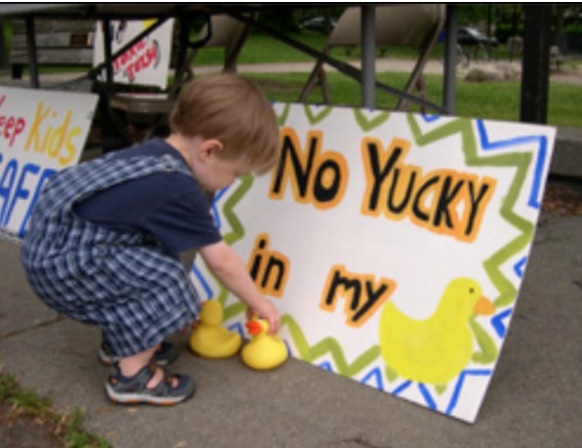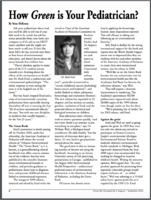Toxins Awareness and Education
In the beginning of the 2000s, much of the Ecology Center's advocacy work focused on the importance of raising awareness of toxins, their ubiquitous prevalence in daily life, and the need for education on reducing exposure.
Green Pediatricians
In the Summer of 2003, the Ecology Center highlighted pediatricians in Michigan who were trying to educate peers about the importance of learning the medical effects of pesticide, mold, Deet, and diesel exposure on patients.
This initiaitive expanded to become "Green Pediatricians," which highlighted the necessity for environmental education in the medical field, particularly pediatrics. The Ecology Center partnered with pediatricians with the understanding that environmental issues, particularly environmental racism, directly impact the health and wellbeing of children. Green Pediatritians believed that many pediatricians did not have adequate training about activities that lead to exposure to hazardous materials and how to treat such exposure. This group of like-minded professionals helped release the "Green Book," which offered scientific literature on environmental hazards' impact on children and guidance for how to diagnose and treat these patients.
Green Chemistry
As the decade continued, awareness around the abundance and dangers of toxins grew. In 2006, the Michigan Green Chemistry Program was created through Executive Directive No. 2006-6. Green Chemistry is the chemistry and chemical engineering practices that foster sustainability and focus on the design and manufacturing of products and processes that reduce or eliminate the use of hazardous substances. This program wanted to protect public health and stimulate economic development that would not result in detrimental environmental impacts. This includes the use and development of chemicals that reduce or eliminate the use of hazardous chemicals, as well as using safe manufacturing processes. The Green Chemistry "Support" program assists in research, development, demonstration, education, and technology transfer of green chemistry activities. This program also launched the Green Chemistry Roundtable that consists of 20 experts in public health, industry, government, environment, economic development, and members of the general public. Along with this roundtable, the Green Chemistry Governor's award program, that awards individuals and organizations in Michigan for their work in fostering Green Chemistry initiatives, and the Annual Green Chemistry and Engineering conference. The Green Chemistry conference gathers to discuss the Green Chemistry movement which is known for replacing toxic chemicals with safe alternative materials. As the Ecology Center championed the importance of acknowledging toxins and their dangers, this work did not go unnoticed. At the 13th annual Green Chemistry & Enginnering conference, Tracey Easthope spoke about the Ecology Center's work to advance Green Chemistry initaitives in Michigan, including the addition of Green Chemistry activities as eligible for state economic development assistance. In that same year, the Ecology Center was awarded at the first Michigan Green Chemistry Gubernatorial Awards at a ceremony in Detroit. They recieved an award for their advocacy efforts in advancing Green Chemistry policy in the state of Michigan.


